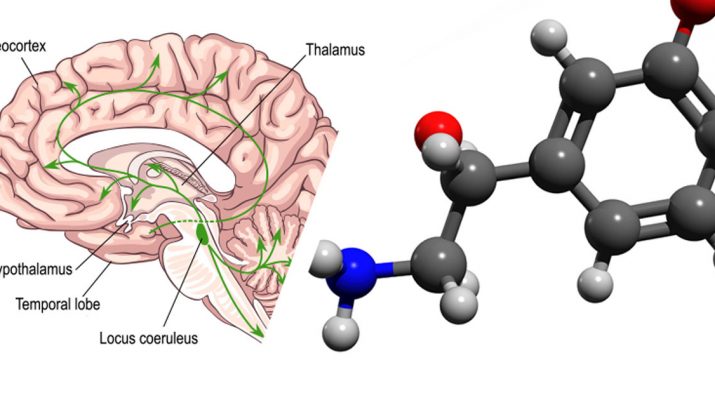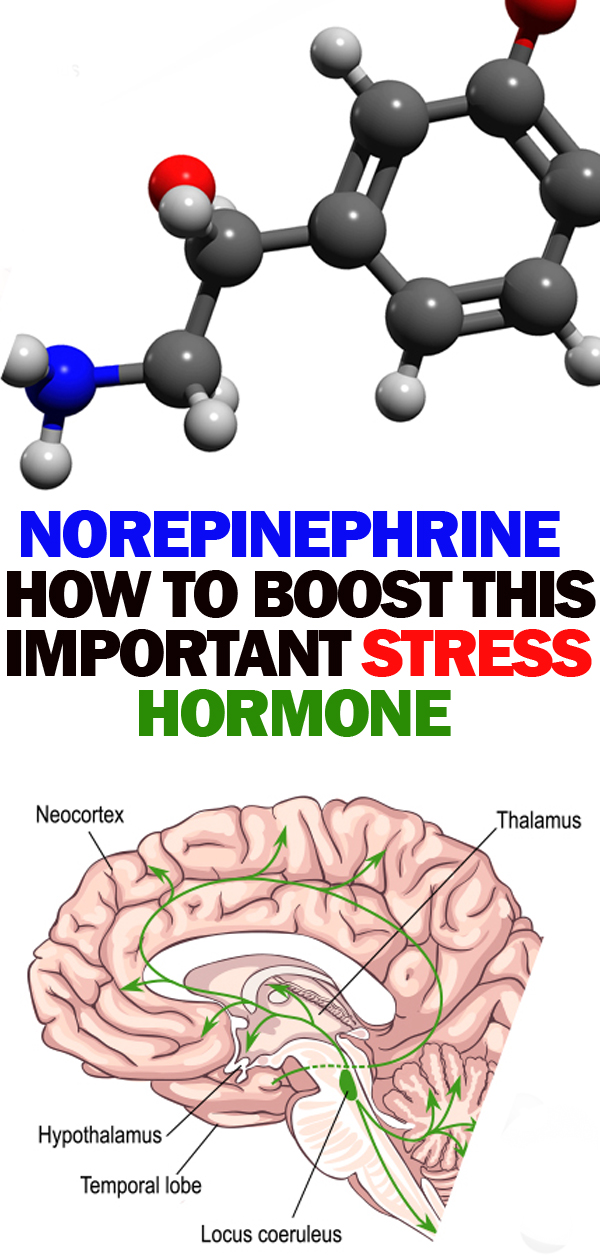You’ve probably heard of adrenaline (or epinephrine) before, but what about another similar hormone called norepinephrine? Like adrenaline, it’s produced during the body’s natural “fight or flight” response and works as one of the body’s first responders to stressful situations.
The hormone also works as a vasoconstrictor, and the FDA has approved its use for blood pressure control and as an adjunct in the treatment of cardiac arrest for people with severely low pressure.
Like all hormones, when norepinephrine levels become too low or too high, it can lead to health conditions, including anxiety, blood pressure changes, brain fog and difficulty sleeping. The key is to keep these stress hormone levels in check by reducing daily stress levels, engaging in regular exercise and maintaining a healthy weight.
What Is Norepinephrine?
Norepinephrine, also called noradrenaline, is a neurotransmitter that belongs to a class of compounds known as catecholamines. Catecholamines are released into the blood in response to both physical and emotional stress. Norepinephrine is synthesized from dopamine and released from the adrenal medulla into the brain. It works as a neurotransmitter in the central nervous system and sympathetic nervous system, where it’s released from our noradrenergic neurons.
As a neurotransmitter, norepinephrine sends signals between our nerve cells. It works by activating alpha 1 receptors that constrict the arteries and work to increase blood pressure so that blood flow returns to the heart.
Noradrenaline also acts as a stress hormone and is widely used as a vasoactive agent that narrows blood vessels and increases blood pressure. It’s responsible for making your heart rate and blood pressure increase during the body’s natural fight or flight response.
When the brain is triggered by a stressful situation, either physical or emotional, the hormone is released into the blood to do its work. It increases your heart rate, boosts blood flow to your muscles and promotes the release of glucose into the blood.
How It’s Used (and Benefits)
1. Increases Blood Pressure
The norepinephrine neurotransmitter is a peripheral vasoconstrictor, which means that it’s able to narrow your blood vessels and increase your blood pressure. For people with very low pressure that can’t be normalized with lifestyle changes, this can be beneficial.
Studies show that medications used to increase norepinephrine levels can be used by patients with symptomatic hypotension that’s unresponsive to remedies like increased water intake, may be important and effective.
The neurotransmitter is commonly used in intensive care units to treat septic shock, which is a severe infection that often leads to very low blood pressure levels and may cause organ failure. In these cases, norepinephrine is given through an IV by a healthcare professional to increase blood pressure levels to a normal range.
2. Increases Alertness and Arousal
Noradrenaline works as a neurotransmitter that increases alertness and arousal, and boosts mood too. When these hormone levels are normal, you’ll have a better ability to concentrate and stay focused. That’s exactly why low noradrenaline levels may lead to conditions such as ADHD.
Research shows that both noradrenaline and dopamine play a role in our ability to focus on everyday tasks. Many medications that are commonly prescribed to improve ADHD symptoms work to raise levels of norepinephrine, including Ritalin, Adderall and Dexedrine.
3. Improves Depression
Preclinical and clinical evidence suggests that disturbances in norepinephrine, dopamine and serotonin neurotransmitters in the central nervous system are involved in the underlying pathophysiology of depression.
Evidence for the involvement of noradrenaline in depression is abundant. Studies have found that the hormone plays a determinant role in regulating cognition, motivation and intellect, which are all important functions in social relationships.
Researchers point out social dysfunction being one of the most important factors affecting our quality of life may be one major reason why low norepinephrine may lead to depression symptoms.
4. Improves Sleep
When it comes to norepinephrine for sleep, many antidepressants that affect the hormone’s signaling are also used to treat insomnia. Studies show that the neurotransmitter is involved in increasing the arousal system, and it impacts the efficacy of many wake- and sleep-promoting medications.
The right amount of the hormone in your body will promote normal sleep, but too much of it will boost arousal and cause sleep issues.
Norepinephrine vs. Epinephrine
What’s the difference between epinephrine and norepinephrine? Both are neurotransmitters and hormones that are produced during the body’s “fight or flight” response and both have important medical or therapeutic uses. Epinephrine, or adrenaline, is well known for its ability to treat anaphylaxis, and it’s also used in cases of cardiac arrest and severe asthma attacks.
An injection of epinephrine can save the life of someone having a severe allergic reaction by opening up the airways so the person can breath. It can also restart your heart during cardiac arrest, when it has stopped pumping.
The biggest difference between epinephrine and norepinephrine is that the latter effects your blood vessels, acting as a vasoconstrictor that works to increase blood pressure, while an adrenaline rush directly effects your heart’s function.
How to Boost Norepinephrine Levels
To increase your norepinephrine levels, some doctors may prescribe serotonin-norepinephrine re-uptake inhibitors (SNRIs), which are drugs for depression, or amphetamines, which are often used to treat ADD and ADHD.
Unfortunately, there are some common side effects of antidepressants, like upset stomach, headaches, restlessness, sexual dysfunction and suicidal thoughts.
For people with low norepinephrine levels, there are also ways to raise the hormone levels naturally. Getting enough sleep and exercising regularly can help to boost norepinephrine.
Studies indicate that our catecholamine levels increase markedly during exercise. Taking serious steps to reduce stress in your life can have a major impact on normalizing stress hormone levels.
Another way to increase norepinephrine levels is by increasing dopamine, which is a precursor for the important neurotransmitter. Taking supplements that will help to boost dopamine, like amino acids tyrosine and phenylalanine may be helpful. There are also brain-boosting norepinephrine supplements on the market that are used to promote dopamine production.
For emergency situations, like sepsis and severe hypotension, norepinephrine is typically administered by continuous IV infusion. This is because the vasoconstrictor has a relatively short half-life of 2.5 minutes. The concentrated norepinephrine drip solution is usually diluted in dextrose-containing solutions in order to provide protection against potential oxidation and loss of drug potency.
To increase norepinephrine as a hypotension treatment, the infusion usually starts at 8 micrograms to 12 micrograms per minute and is then titrated to the desired pressure depending on the patient’s condition. The average maintenance norepinephrine dose is 2–4 micrograms per minute.
Norepinephrine Deficiency Symptoms
Norepinephrine deficiency occurs when the neurotransmitter levels become too low. People with certain health conditions, like chronic stress and poor nutrition, or those taking certain medications may develop a deficiency because the body begins to produce less norepinephrine than what is needed.
This can contribute to a range of physical and mental conditions, including:
- depression
- anxiety
- lack of interest
- low energy
- daytime fatigue
- general apathy
- ADHD symptoms
- trouble sleeping
- memory problems
- brain fog
- migraines
- fibromyalgia
- restless leg syndrome
- hypoglycemia
- low blood pressure
Research shows that norepinephrine deficiency is caused by the degeneration of neurons from the brain. This can be due to chronic stress, obesity and certain medical conditions, like Parkinson’s disease.
Signs of Too Much Norepinephrine
It is possible for your norepinephrine levels to become too high, causing health issues like high blood pressure, heart palpitations, headaches and anxiety.
When these hormone levels increase rapidly, it can even lead to panic attack symptoms. Too much norepinephrine can be caused by a few factors, including chronic stress and obesity.
As of the five major neurotransmitters that are responsible for regulating mood, energy, sleep and memory, a sudden rush of norepinephrine can make your body think it’s in danger, leading to noticeable symptoms.
Precautions
Norepinephrine should be used to improve hypotension by trained healthcare professionals. It works as a vasoconstrictor and too much of it can result in decreased blood flow to major organs, potentially leading to irreversible organ injury and failure.
Research shows that when the vasoconstrictor is used to treat low blood pressure in the case of hypovolemia, or a state of decreased blood volume or body fluid, norepinephrine is not the best therapeutic agent.
Norepinephrine hormone should not be used by patients with vascular thrombosis, as its vasoconstriction effects will increase the area of ischemia and infraction.
People using brain-boosting supplements that are used to increase dopamine levels should first consult with a healthcare professional, especially if they are already taking pharmaceutical medications or other dietary supplements.
Final Thoughts
- Norepinephrine, or noradrenaline, is a neurotransmitter and stress hormone that belongs to a class of compounds known as catecholamines.
- This stress hormone is released into the blood in response to both physical and emotional stress. It’s known as one of the first responders to stress.
- What is norepinephrine used for? It works as a vasoconstrictor that narrows blood vessels and increases blood pressure. It has also shown to improve attention and focus, symptoms of depression and sleep.
- Supplements that are used to increase dopamine may help to boost norepinephrine levels. Other ways to boost this hormone naturally include regular exercise and getting enough rest.


